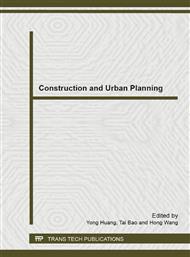p.2511
p.2515
p.2520
p.2526
p.2530
p.2535
p.2542
p.2547
p.2551
Analysis on the Daily Temperature Variation of a Concrete Slab under Environmental Effects
Abstract:
The dynamic temperature field of a concrete slab is actively studied in this study with the aiding of the commercial package ANSYS. Fine finite element model of the concrete slab is constructed and different boundary conditions are applied to obtain the temperature distribution within the slab with the aid of the commercial software package ANSYS. The solar radiation model is utilized to estimate the solar radiation received by the slab and the shelter effects are also taken into consideration. The numerical models can successfully predict the structural temperature at different time. The made observations demonstrate that the simulated temperature variation of the concrete slab based on the solar radiation model agrees well with measurement results. It is seen that the numerical models can successfully predict the structural temperature field at different time. The methodology employed in the paper can be applied to other concrete structures as well.
Info:
Periodical:
Pages:
2530-2534
Citation:
Online since:
March 2013
Authors:
Price:
Сopyright:
© 2013 Trans Tech Publications Ltd. All Rights Reserved
Share:
Citation:


